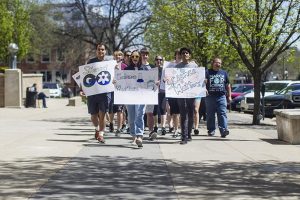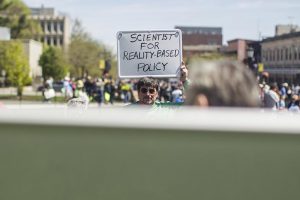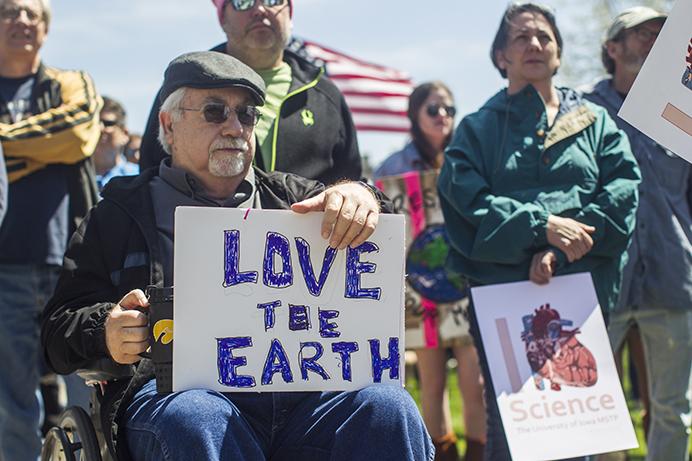By Jenna Larson
Hundreds gathered on the Pentacrest for Iowa City’s March for Science on April 22.
Marchers carried signs supporting funding of science programs, encouraging environmental protection, and defending scientific research. The event began with several speakers who discussed their experience with science.Mo Payne, a UI graduate student in chemistry, talked about what drew him to science in the first place.
“I haven’t always been a scientist, nor have I always wanted to be a scientist,” he said. “After college, my wife and I lived in southern India and taught school children. Of the many culture shocks that we experienced, one that stood out most to me was access to safe water.”
This was what drew him to science, he said, because he was continuously asking scientific questions.
“We live in a world where we shouldn’t just accept what’s told to us as the one and only truth,” he said. “We shouldn’t sit idly by and refuse to change that with which

we can clearly see what can be improved upon.
“That’s why it’s so exciting to see so many people here today. They are all part of a much larger worldwide recognition for the importance of science in the never-ending pursuit of knowledge.”
David Leshtz, the local district representative for Rep. Dave Loebsack, D-Iowa, read a letter on behalf of Loebsack.
“Science holds the key to improving our environment [and] combating climate change,” he said. “The silence [has] settled on climate change … Cutting funding from the Environmental Protection Agency, energy-efficiency programs, and global-climate initiatives will move us backwards when we need to move forward. I’m committed to fighting for full funding to combat climate change and to protect our environment for future generations.”
Tori Forbes, a UI associate professor of chemistry, spoke with her family and stressed the importance of knowing that science is a public good.
“Every day, I and my graduate students, we go into the lab, and we learn about how to keep our water safe,” she said. “We also learn how to make cleaner water, but I want to you to realize that we do this for you.

Science is a public good.”
Forbes said when she receives grants for her work, she can continue adding knowledge to the public good.
“It is so important to the future that we continue to educate the future generations of scientists, and that includes all you kids out there,” she said.
After the 10 speakers, the crowd marched from the Pentacrest, around the Biology Building, and back to the Pentacrest.
The event concluded with teach-in sessions in which topics were discussed in small groups and an open mic in which attendees were encouraged to talk for one minute about what science means to them and why they were there.



